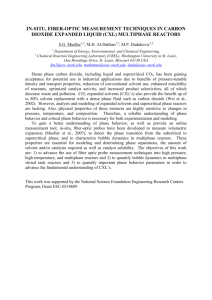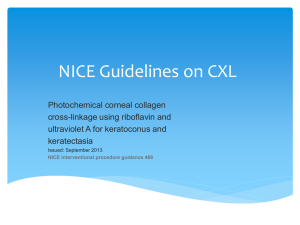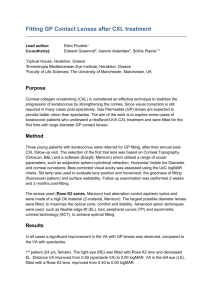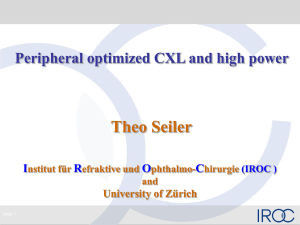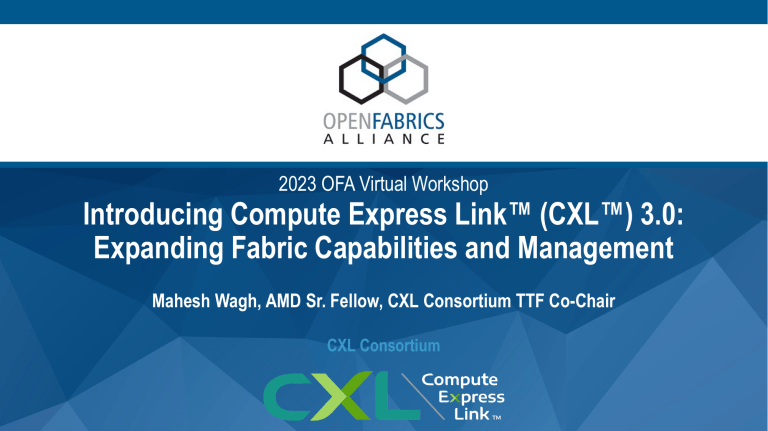
2023 OFA Virtual Workshop Introducing Compute Express Link™ (CXL™) 3.0: Expanding Fabric Capabilities and Management Mahesh Wagh, AMD Sr. Fellow, CXL Consortium TTF Co-Chair CXL Consortium CXLBoard of Directors Industry Open Standard for High Speed Communications 240+ Member Companies Compute Express Link™ and CXL™ are trademarks of the Compute Express Link Consortium. CXLOverview • New breakthrough high-speed fabric • Enables a high-speed, efficient interconnect between CPU, memory and accelerators • Builds upon PCI Express® (PCIe®) infrastructure, leveraging the PCIe® physical and electrical interface • Maintains memory coherency between the CPU memory space and memory on CXL attached devices • Enables fine-grained resource sharing for higher performance in heterogeneous compute environments • Enables memory disaggregation, memory pooling and sharing, persistent memory and emerging memory media • Delivered as an open industry standard • CXL 3.0 specification is fully backward compatible with CXL 1.1 and CXL 2.0 • Future CXL Specification generations will include continuous innovation to meet industry needs and support new technologies Compute Express Link™ and CXL™ are trademarks of the Compute Express Link Consortium. 3 CXLSpecification Release Timeline March 2019 September 2019 CXL 1.0 Specification Released CXL Consortium Officially Incorporates November 2020 CXL 2.0 Specification Released August 2022 CXL 3.0 Specification Released CXL 1.1 Specification Released Compute Express Link™ and CXL™ are trademarks of the Compute Express Link Consortium. 4 Recap: CXL1.0/1.1 Usages TYPE 1 TYPE 2 TYPE 3 USAGES • PGAS NIC • NIC atomics Cache USAGES • GP GPU • Dense computation PROTOCOLS • CXL.io • CXL.memory Memory Controller USAGES • Memory BW expansion • Memory capacity expansion • Storage class memory Compute Express Link™ and CXL™ are trademarks of the Compute Express Link Consortium. Memory Accelerator Processor Memory Cache CXL • CXL.io • CXL.cache • CXL.memory Memory Accelerator NIC CXL PROTOCOLS Memory • CXL.io • CXL.cache HBM PROTOCOLS Processor HBM CXL Processor DDR DDR Memory Buffers DDR DDR Accelerators with Memory DDR DDR Caching Devices / Accelerators Recap: CXL2.0 Switch Capability CXL 2.0 [Add H1 • Supports single-level switching CXL • Enables memory expansion and resource allocation CXL Switch CXL CXL CXL CXL D1 D2 D3 D# Compute Express Link™ and CXL™ are trademarks of the Compute Express Link Consortium. 6 Recap: CXL2.0 Memory Pooling 1 1 H1 H2 H3 H4 H# 2 CXL 2.0 Switch D1 D2 D3 D# D4 2 Device memory can be allocated across multiple hosts. Multi Logical Devices allow for finer grain memory allocation 3 Persistence Flows 4 Pooling of accelerators Hot-plug flows Compute Express Link™ and CXL™ are trademarks of the Compute Express Link Consortium. 7 CXL3.0 Specification Industry trends • Use cases driving need for higher bandwidth: e.g., high performance accelerators, system memory, SmartNIC etc. • CPU capability requiring more memory capacity and bandwidth per core • Efficient peer-to-peer resource sharing/ messaging across multiple domains • Memory bottlenecks due to CPU pin and thermal constraints needs to be overcome CXL 3.0 introduces… • Double the bandwidth • Zero added latency over CXL 2.0 • Fabric capabilities • Multi-headed and fabric attached devices • Enhance fabric management • Composable disaggregated infrastructure • Improved capability for better scalability and resource utilization • Enhanced memory pooling • Multi-level switching • Direct memory/ Peer-to-Peer accesses by devices • New symmetric memory capabilities • Improved software capabilities • Full backward compatibility with CXL 2.0, CXL 1.1, and CXL 1.0 CXL 3.0 is a huge step function with fabric capabilities while maintaining full backward compatibility with prior generations 4/11/2023 Compute Express Link™ and CXL™ are trademarks of the Compute Express Link Consortium. CXL3.0: Doubles Bandwidth with Same Latency • Uses PCIe 6.0® PHY @ 64 GT/s • PAM-4 and high BER mitigated by PCIe 6.0 FEC and CRC (different CRC for latency optimized) • Standard 256B Flit along with an additional 256B Latency Optimized Flit (0-latency adder over CXL 2) • 0-latency adder trades off FIT (failure in time, 109 hours) from 5x10-8 to 0.026 and Link efficiency impact from 0.94 to 0.92 for 2-5ns latency savings (x16 – x4)1 • Extends to lower data rates (8G, 16G, 32G) • Enables several new CXL 3 protocol enhancements with the 256B Flit format Compute Express Link™ and CXL™ Consortium are trademarks of the Compute Express Link Consortium. 9 CXL3.0 Protocol Enhancements (UIOand BI) for Device to Memory Connectivity CXL 3.0 enables non-tree H1 H2 H3 H4 H# CXL CXL CXL CXL CXL 11 topologies and peer-to-peer communication (P2P) within a virtual hierarchy of devices CXL Switch(es) Direct P2Paccess including HDMMemory CXL CXL CXL CXL CXL CXL CXL D1 D2 D3 D4 D5 D6 D# • Virtual hierarchies are associations of devices that maintains a coherency domain • P2P to HDM-DB memory is I/O Coherent: a new Unordered I/O (UIO) Flow in CXL.io – the Type-2/3 device that hosts the memory will generate a new Back-Invalidation flow (CXL.Mem) to the host to ensure coherency if there is a coherency conflict Compute Express Link™ and CXL™ Consortium are trademarks of the Compute Express Link Consortium. 10 CXL3.0 Protocol Enhancements: Mapping Large memory in Type-2 Devices to HDMwith Back Invalidate Existing Bias – Flip mechanism needed HDM to be tracked fully since device could not back snoop the host. Back Invalidate with CXL 3.0 enables snoop filter implementation resulting in large memory that can be mapped to HDM Compute Express Link™ and CXL™ Consortium are trademarks of the Compute Express Link Consortium. CXL3.0: Memory Pooling & Sharing H1 H2 H3 S1 Copy S2 Copy S2 Copy S3 Copy S1 Copy H4 S1 Copy S3 Copy CXL 2.0 Switch(es) Standardized CXL Fabric Manager D1 S2 D2 D3 1 H# 2 D# D4 S1 1 3 S3 Expanded use case showing memory sharing and pooling 2 CXL Fabric Manager is available to setup, deploy, and modify the environment 3 Shared Coherent Memory across hosts using hardware coherency (directory + Back-Invalidate Flows). Allows one to build large clusters to solve large problems through shared memory constructs. Defines a Global Fabric Attached Memory (GFAM) which can provide access to up to 4095 entities Compute Express Link™ and CXL™ Consortium are trademarks of the Compute Express Link Consortium. 12 CXL3.0: Multiple Level Switching, Multiple Type-1/2 1 Each host’s root port can connect to more than one device type (up to 16 CXL.cache devices) 2 Multiple switch levels (aka cascade) • Supports fanout of all device types Compute Express Link™ and CXL™ Consortium are trademarks of the Compute Express Link Consortium. 13 CXL3.0 Fabrics Composable Systems with Spine/Leaf Architecture CXL 3.0 Fabric Architecture • CXL Switch Example traffic flow CXL Switch CXL Switch Spine Switches CXL Switch CXL Switch Leaf Switches • • • • Interconnected Spine Switch System Leaf Switch NIC Enclosure Leaf Switch CPU Enclosure Leaf Switch Accelerator Enclosure Leaf Switch Memory Enclosure Fabric Manager CXL Switch Accelerator Memory CPUs CPUs GFAM GFAM GFAM NIC NIC End Devices Compute Express Link™ and CXL™ Consortium are trademarks of the Compute Express Link Consortium. 14 CXL3.0 Summary CXL 3.0 features • Full fabric capabilities and fabric management • Expanded switching topologies • Enhanced coherency capabilities • Peer-to-peer resource sharing • Double the bandwidth and zero added latency compared to CXL 2.0 • Full backward compatibility with CXL 2.0, CXL 1.1, and CXL 1.0 Enabling new usage models Call to Action • Memory sharing between hosts and peer devices • Download the CXL 3.0 specification • Support for multi-headed devices • Support future specification development by joining the • Expanded support for Type-1 and CXL Consortium Type-2 devices • Follow us on Twitter and • GFAM provides expansion capabilities for current and future LinkedIn for updates! memory Compute Express Link™ and CXL™ Consortium are trademarks of the Compute Express Link Consortium. 15 Thank You www. ComputeExpressLink.org Compute Express Link™ and CXL™ Consortium are trademarks of the Compute Express Link Consortium.

